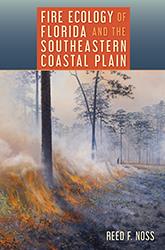Fire Ecology of Florida and the Southeastern Coastal Plain
Reed F. Noss
Hardcover: $70.00
Paper: $35.00
Paper: $35.00
An overview of the importance of fire to ecosystems in the Southeast, with guidance on how to best conduct controlled burns in the region
“A major contribution to ecology studies and fire science. . . . Essential.”—Choice
“A work that will benefit not only land managers and policy makers, but all wildlife biologists, foresters, botanists and others who seek to ensure special places remain that way.”—Wildfire Magazine
“Simultaneously serves as a roadmap for practicing scientists and managers and as an accessible primer for lay naturalists; it should be read by any person with an interest in fire ecology.”—Journal of Wildlife Management
“Tackles many aspects of fire in the past, present, and future, within an exceedingly fire-prone and biologically diverse region.”—Bulletin of the Ecological Society of America
“Invaluable to land managers across the country, as all these principles apply to natural communities and fire-dependent species, regardless of geographic location.”—Natural Areas Journal
"A thorough, current, and strongly focused summary of fire ecology and management in the southeastern U.S., sure to foster discussion and more thoughtful application of fire to this region's diverse, pyrogenic landscapes."—Eric Menges, senior research biologist, Archbold Biological Station
"An engaging read. Noss weaves history, his own relationship to Florida's fire-prone landscape, and current science to create a deep synthesis of what is known about fire, its interaction with plants and animals, and how land management affects their shared future."—J. Morgan Varner, research scientist, USDA Forest Service
"Compiles and synthesizes information on the many fascinating aspects of fire ecology in Florida and the southeastern Coastal Plain."—Jean Huffman, Louisiana State University
A biodiversity hotspot, Florida is home to many ecosystems and species that evolved in the presence of frequent fire. In this book, Reed Noss discusses the essential role of fire in generating biodiversity and offers best practices for using fire to keep the region's ecosystems healthy and resilient.
Reviewing several lines of evidence, Noss shows that fire has been important to the southeastern Coastal Plain for tens of millions of years. He explains how the region's natural fire regimes are connected to its climate, high rate of lightning strikes, physical chemistry, and vegetation. But urbanization and active fire suppression have reduced the frequency and extent of fires. Noss suggests the practice of controlled burning can and should be improved to protect fire-dependent species and natural communities from decline and extinction.
Noss argues that fire managers should attempt to simulate natural fire regimes when conducting controlled burns. Based on what the species of the Southeast likely experienced during their evolutionary histories, he makes recommendations about pyrodiversity, how often and in what seasons to burn, the optimal heterogeneity of burns, mechanical treatments such as cutting and roller-chopping, and the proper use of fuel breaks. In doing so, Noss is the first to apply the new discipline of evolutionary fire ecology to a specific region. This book is a fascinating history of fire ecology in Florida, an enlightening look at why fire matters to the region, and a necessary resource for conservationists and fire managers in the state and elsewhere.
Reed F. Noss is lead scientist for the Center for Landscape Conservation Planning at the University of Florida and chief science advisor for the Southeastern Grasslands Institute. He is the author of several books, including Forgotten Grasslands of the South: Natural History and Conservation.
- Sample Chapter(s):
- Table of Contents
- Excerpt
There are currently no reviews available












